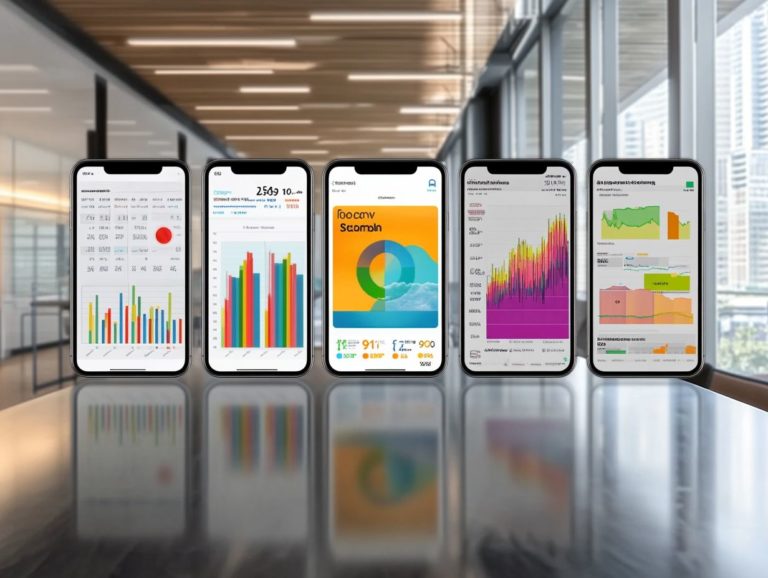The Importance of Follow-Up in Performance Management
In today s evolving workplace dynamics, effective performance management is crucial for fostering both individual and organizational success.
A key element in this process is the often-overlooked aspect of follow-up. This exploration delves into the vital role that follow-up plays in boosting employee performance and morale.
From the importance of regular check-ins to best practices for setting and tracking goals, you ll discover strategies that ensure your performance management efforts achieve optimal results.
We ll also examine the potential repercussions of neglecting follow-up, giving you a comprehensive understanding of its significance. Get ready to change how you manage employee performance!
Contents
- Key Takeaways:
- The Role of Follow-Up in Performance Management
- Types of Follow-Up in Performance Management
- Best Practices for Effective Follow-Up
- Potential Consequences of Neglecting Follow-Up
- Implementing Follow-Up in Performance Management
- Frequently Asked Questions
- What is the importance of follow-up in performance management?
- How does follow-up improve employee performance?
- What are the benefits of follow-up in performance management for managers?
- What are the benefits of follow-up in performance management for employees?
- How often should follow-up occur in performance management?
- How can managers effectively follow-up with their employees?
Key Takeaways:

- Timely follow-up is key to effective performance management.
- Incorporate regular check-ins and reviews into your process.
- Practice open communication and goal tracking for employee success.
Defining Performance Management
Performance management is your strategic ally in enhancing employee performance and aligning with organizational goals. It unfolds through structured processes like performance reviews, feedback loops, and goal-setting.
Imagine a continuous cycle that incorporates coaching conversations and the evaluation of performance metrics. This overall method cultivates a workplace culture that values employee engagement and personal growth.
This approach highlights strengths and shows where you can grow, fostering opportunities for growth and accountability among your team.
Historically, performance management has transformed from basic annual appraisals into a dynamic system that embraces ongoing feedback and coaching. In today s fast-paced business environment, this evolution underscores its critical importance.
Effective communication is vital, as it establishes the foundation for trust and collaboration within teams. Focus on regular feedback and use available resources to help your team navigate challenges and achieve both personal and professional milestones.
This approach does more than just lift morale; it aligns individual contributions with broader organizational objectives, ultimately driving success across the board.
The Role of Follow-Up in Performance Management
Follow-up is a vital aspect of performance management, ensuring that employee development is in sync with team objectives and organizational goals. Engaging in effective follow-up meetings provides a valuable opportunity for helpful feedback and recognition of achievements.
This fosters a culture of open dialogue, where communication styles are customized to meet individual needs. Such ongoing engagement boosts employee performance and strengthens the trust and respect between managers and their direct reports, driving improved performance metrics and personal growth.
Why Follow-Up is Important
Follow-up is vital in performance management. It provides you with continuous feedback that highlights areas for improvement and growth opportunities. This practice builds trust. It also encourages open communication among team members. Constructive feedback can be delivered promptly, enhancing motivation and performance.
Effective follow-up creates feedback loops that allow managers to track ways to measure success, ensuring alignment with organizational goals.
By consistently checking in with you and your team members, management reinforces expectations while demonstrating a genuine commitment to your development. For instance, regular one-on-one meetings can serve as an invaluable platform for you to voice concerns and seek clarity on your role.
Implementing strategies like peer feedback sessions encourages collaboration and fosters a sense of belonging within the team. This ongoing engagement sends a clear message that management values your contributions, laying the foundation for improved morale and leading to higher productivity across the organization.
Building trust through these follow-up interactions enriches workplace culture, creating an environment where you can thrive.
Types of Follow-Up in Performance Management
You will find a range of follow-up mechanisms in performance management, each designed to enhance ongoing communication and evaluate employee performance effectively. Regular check-ins allow you to monitor progress and tackle concerns as they arise, fostering a proactive environment.
Structured performance reviews offer a thorough assessment of achievements and pinpoint areas for improvement. Follow-up meetings can include coaching conversations that emphasize personal growth and accountability, ensuring alignment with team objectives and organizational goals.
Regular Check-Ins

Regular check-ins are essential tools that energize your performance management process! They provide you with structured opportunities to engage with your employees and discuss performance improvement in a supportive environment.
These sessions encourage open dialogue, allowing for timely feedback loops and coaching conversations that enhance employee engagement and motivation. By focusing on individual coaching, you can tailor your communication to fit the unique needs and strengths of your direct reports.
Incorporating regular check-ins into your work routine can significantly boost morale and foster a sense of belonging among team members. When you prioritize these interactions, you create a culture of continuous feedback and professional growth, reinforcing the importance of employee development.
Effective check-ins may include strategies such as:
- Set clear agendas
- Ask open-ended questions
- Genuinely listen to employees’ concerns and aspirations
This approach nurtures individual growth and promotes a collaborative atmosphere, ultimately leading to increased productivity and a more engaged workforce. By developing strong relationships during these sessions, you can better align team goals with organizational objectives, creating a win-win environment for everyone involved.
Act now to implement regular check-ins! Start your first regular check-in today to unlock your team s full potential!
Performance Reviews
Performance reviews serve as formal assessments to evaluate your performance over a specific period. They offer invaluable feedback that highlights both your strengths and areas for improvement.
This structured evaluation process typically involves a performance review, where your contributions are analyzed against established metrics. This sets the stage for future performance goals and provides a comprehensive assessment of your strengths, supporting your personal growth and development.
The frequency and format of these reviews are crucial for ensuring they are effective and beneficial for you and the organization. Regular feedback, whether quarterly or annually, encourages ongoing dialogue between you and your manager. This fosters a culture of transparency and accountability.
Employing various formats such as one-on-one discussions, peer reviews, or self-assessments can enrich the review experience by incorporating diverse perspectives. Best practices include setting clear, achievable objectives and delivering constructive, balanced feedback that motivates you to excel.
By emphasizing continuous improvement and aligning your personal goals with the organization s mission, performance reviews can significantly elevate your engagement and overall productivity.
Best Practices for Effective Follow-Up
Implementing best practices for effective follow-up in performance management requires a harmonious blend of communication and collaboration techniques. This creates an environment ripe for employee performance enhancement.
By collaboratively setting and tracking goals, you foster transparency and accountability. Regularly recognizing achievements reinforces positive behavior.
These practices not only streamline performance tracking but also elevate team dynamics and engagement, ensuring that everyone is moving forward together.
Communication and Collaboration
Effective communication and collaboration are essential for cultivating a culture of constructive dialogue within performance management frameworks. This makes you feel valued and heard, which is vital for your growth!
By customizing communication styles to align with your preferences and encouraging open dialogue, managers can enhance your engagement and foster a sense of belonging. Tailored coaching techniques further nurture an environment where feedback is welcomed as a means of continuous improvement.
For example, a manager might utilize active listening techniques during one-on-one meetings, creating a safe space for you to express your thoughts and concerns. This not only builds trust but also promotes honest feedback, significantly influencing overall performance.
By implementing regular check-ins, communication is not confined to formal reviews. This allows for ongoing discussions about your progress and areas for development. This proactive approach enables teams to align their goals more effectively, fostering a collaborative atmosphere where you can meaningfully contribute to the organization s success.
Setting and Tracking Goals
Setting and tracking goals is essential for effective performance management. It lays the groundwork for clear expectations and accountability in employee performance.
By utilizing the SMART criteria Specific, Measurable, Achievable, Relevant, and Time-bound you ensure your performance goals are not only attainable but also aligned with both your aspirations and the broader organizational objectives.
As you monitor progress through performance tracking, you can provide timely feedback and make necessary adjustments to promote sustained growth.
This clear structure shows you what success looks like and helps you thrive. It fosters open dialogue and collaboration between you and your manager, nurturing a culture of transparency.
Regular performance reviews create a dynamic tracking system, allowing you to make adjustments based on real-time data and insights. Ultimately, embracing this comprehensive framework cultivates a motivated workforce that is fully engaged, ensuring that both your goals and those of the organization are consistently met.
Take charge of your development today!
Potential Consequences of Neglecting Follow-Up

Neglecting follow-up in performance management can have serious repercussions that affect both employee performance and morale. When there s a lack of regular communication and feedback, employees may begin to feel undervalued and disengaged. This leads to a decline in accountability and lower performance metrics.
Failing to follow up erodes trust between managers and employees. This stifles open dialogue and mutual respect, which are essential for a thriving workplace.
Impact on Employee Performance and Morale
Neglecting to follow up can have a profound impact on your employees performance and morale. This often leads to reduced motivation and increased turnover rates. When your team members don t receive helpful feedback or regular feedback, they may start to feel uncertain about their contributions and disengaged from the workplace culture.
This disengagement can ripple through team dynamics, creating an environment of distrust that exacerbates performance issues and stifles personal development.
Organizations that prioritize regular feedback see a boost in employee engagement and retention! For instance, a Gallup study revealed that employees who receive frequent feedback are 3.6 times more likely to be engaged.
When individuals feel their efforts go unacknowledged or that their work lacks direction, it s no surprise they become unmotivated to improve. This was clearly demonstrated in a tech company that opted for biannual reviews instead of ongoing check-ins, which led to a noticeable decline in team morale and creativity.
Therefore, fostering a culture rich in helpful feedback not only enhances individual performance but also contributes to a healthier work environment. Prioritizing open communication can make all the difference in how your team thrives.
Implementing Follow-Up in Performance Management
Implementing follow-up in performance management demands a systematic approach that starts with well-defined steps to weave this crucial practice into your organizational processes. By leveraging performance management software software designed to help track and improve employee performance you can streamline the feedback cadence, making it simpler for you to track employee development.
Incorporating coaching techniques during follow-up interactions enhances the quality of feedback and fosters personal growth, ensuring that your employees feel supported every step of the way in their performance journey.
Steps to Incorporate Follow-Up into the Process
Incorporating follow-up into your performance management processes involves several key steps that significantly enhance communication and foster a culture of accountability.
First, it s crucial to establish clear communication styles tailored to each employee’s needs, ensuring effective interactions that resonate. Next, setting specific performance improvement goals allows you to provide targeted feedback and recognition, reinforcing positive behaviors and contributing to overall employee development.
It s important to schedule regular check-in meetings to discuss progress, address challenges, and adjust goals as necessary. This ongoing dialogue not only helps maintain alignment with organizational objectives but also motivates employees by making them feel valued and heard.
Incorporating feedback mechanisms, like surveys or informal discussions, can further bolster open communication. Recognizing achievements whether through verbal acknowledgment or formal rewards strengthens morale and nurtures a culture of recognition, ultimately driving productivity and employee engagement.
Frequently Asked Questions
What is the importance of follow-up in performance management?

Follow-up in performance management is essential for monitoring and evaluating employee performance, providing feedback and guidance, and highlighting the importance of follow-up training to identify areas for improvement.
Understanding the importance of follow-up is just the beginning. Start applying these insights today to enhance your team’s performance!
How does follow-up improve employee performance?
Regular follow-ups help managers see great work and spot areas for improvement. They also give the right support and tools to help employees reach their goals.
What are the benefits of follow-up in performance management for managers?
Follow-ups help managers track progress towards goals. They can spot potential issues and make changes to boost overall performance.
What are the benefits of follow-up in performance management for employees?
Follow-ups give employees a clear picture of what s expected from them. They also provide chances for growth and recognize their hard work.
How often should follow-up occur in performance management?
How often should you check in? It depends on your team’s needs, but regular check-ins at least quarterly are a great start!
How can managers effectively follow-up with their employees?
Effective follow-up includes clear expectations and constructive feedback. Active listening to employee concerns is also key, so document discussions and track progress!



